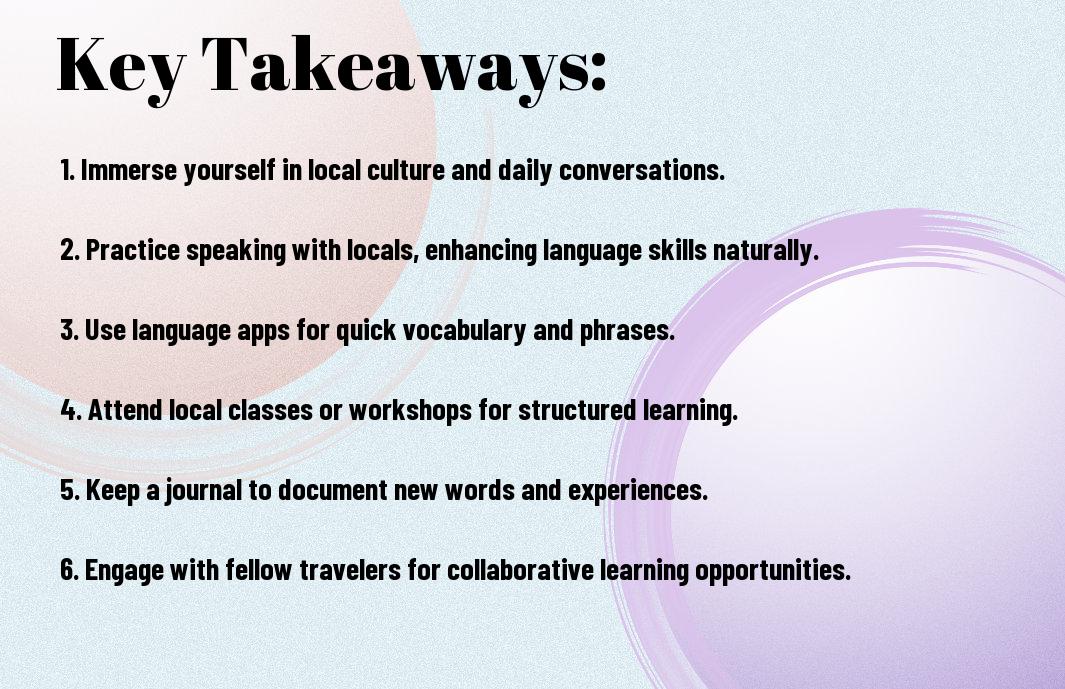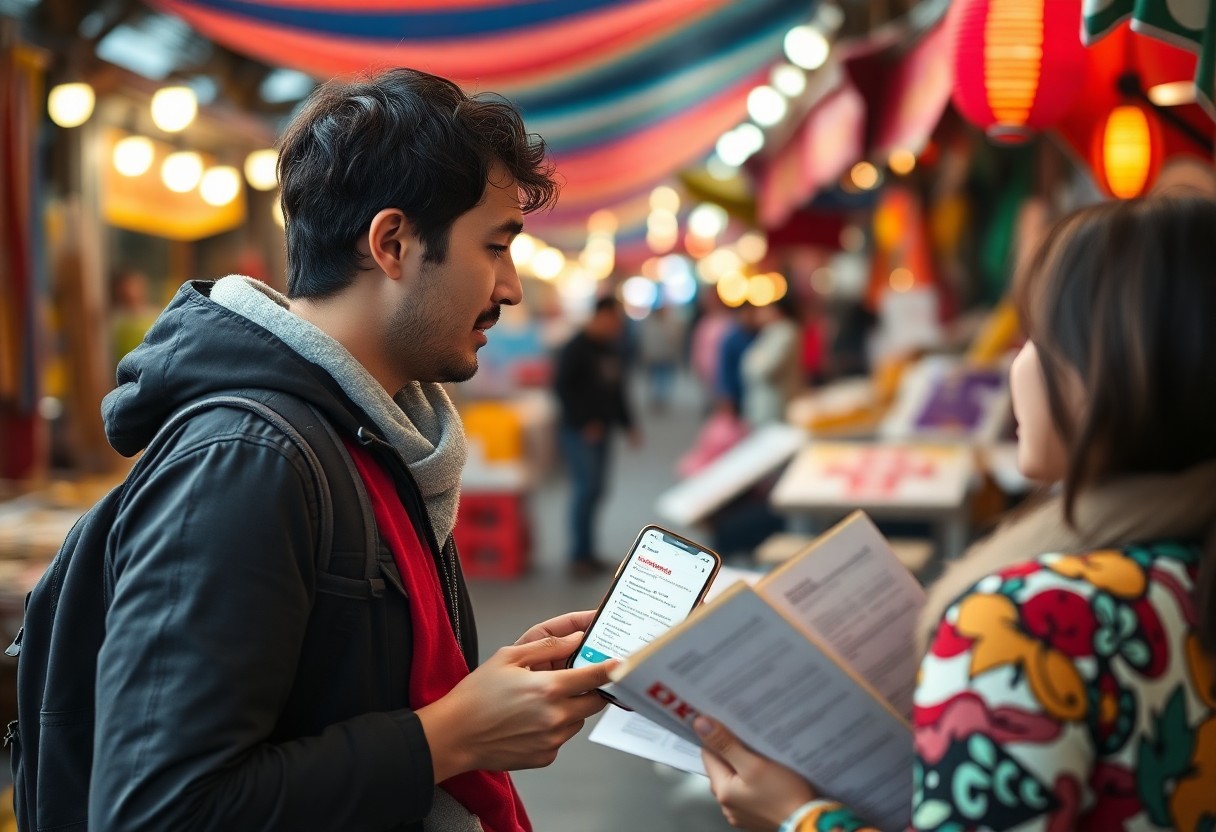As you launch on your foreign escapade, you’ll discover that grasping the local lingo is the key to unlocking the true essence of your destination. You’ll find yourself immersed in a world of unfamiliar sounds, sights, and sensations, and your curiosity will be piqued. Your wanderlust spirit will drive you to communicate with the locals, and before you know it, you’ll be picking up phrases and sentences like a pro, making your journey even more exhilarating and authentic, as you navigate the uncharted territories of a new language.
Key Takeaways:
To maximize your language learning experience while traveling abroad, consider the following points:
- Immerse yourself in the local culture by engaging with native speakers, trying local food, and attending cultural events to pick up on nuances of the language.
- Use language learning apps to supplement your learning, such as Duolingo or Babbel, which offer interactive lessons and exercises to help you stay on track.
- Take language classes with a qualified instructor who can provide personalized feedback and help you improve your pronunciation, grammar, and vocabulary.
- Practice active listening by watching local TV shows or movies, listening to music, and engaging in conversations with native speakers to improve your comprehension skills.
- Keep a language journal to track your progress, note new vocabulary and phrases, and reflect on your experiences, which can help you stay motivated and focused on your language learning goals.
Preparation
While exploring a new country, you’ll want to be prepared to learn the local language, and that starts before you even leave home, with a solid plan and the right mindset to tackle the challenges of language learning on the go.
Researching Language Learning Resources
On the cusp of your journey, you’ll find that researching language learning resources is an exciting part of the preparation process, as you discover the many tools and apps at your disposal to help you learn a language while traveling abroad.
Setting Realistic Goals
At the outset, you’ll need to set achievable goals for your language learning, considering your starting level, the duration of your trip, and the amount of time you can dedicate to language study each day, to ensure a successful and enjoyable experience.
Resources such as language learning podcasts, YouTube channels, and mobile apps will aid you in setting realistic goals, as you can track your progress and adjust your targets accordingly, allowing you to stay motivated and focused on your language learning journey as you travel abroad.

Immersion Techniques
Any language learner knows that immersion is key to picking up a new tongue, and traveling abroad offers the perfect opportunity to surround yourself with the language you’re trying to learn.
Conversing with Locals
Technically, striking up a conversation with a local can be as simple as asking for directions or ordering food, and you’ll be surprised at how much your language skills improve with just a few interactions.
Watching Local Media
Around every corner, you’ll find opportunities to tune in to local TV, radio, or online content, which can help you get a feel for the rhythm and vocabulary of the language, and you’ll be amazed at how much you can pick up from your favorite foreign shows.
And as you settle into your new surroundings, you’ll find that watching local media becomes second nature, from news broadcasts to soap operas, and you’ll start to notice nuances in the language that you wouldn’t have caught in a classroom, giving you a more authentic understanding of the culture and its people.
Language Learning Tools
Not having the right tools can hinder your language learning process, but fear not, dear traveler, for you can find plenty of resources online, such as My Tried-and-Tested Language Learning Guide to Survive in a Foreign Country, to help you navigate the linguistic landscape.
Mobile Apps and Software
After settling into your new surroundings, you’ll find that mobile apps and software are fantastic companions for language learning, offering interactive lessons and exercises to keep you engaged on-the-go.
Language Exchange Programs
Software and technology have made language exchange programs more accessible, allowing you to connect with native speakers and practice your language skills in a conversational setting.
But as you investigate into language exchange programs, you’ll discover that they offer more than just language practice – they also provide a unique opportunity to learn about the culture and customs of the place you’re visiting, allowing you to connect with locals on a deeper level and make your travels even more enriching.

Cultural Adaptation
All travelers know that adapting to a new culture can be a wild adventure. As you wander through foreign streets, you’ll encounter customs and traditions that will leave you bewildered and fascinated.
Adapting to Local Customs
For instance, you’ll find that local etiquette can vary greatly from what you’re used to, so it’s a good idea to brush up on your knowledge of regional manners to avoid unintentionally offending the locals.
Overcoming Cultural Barriers
Before diving headfirst into a new culture, you’ll need to be prepared to encounter some obstacles, and the biggest hurdle is often the language barrier, but don’t worry, you’ll find ways to navigate it.
Due to the inevitable mistakes you’ll make, you’ll learn to laugh at yourself and find creative solutions to communicate with the locals, and as you do, you’ll start to feel more at home in your new surroundings, and your language skills will improve dramatically as you immerse yourself in the local culture.
Staying Motivated
Keep your language learning journey exciting by immersing yourself in the local culture, and you’ll find that staying motivated comes naturally. As you travel abroad, surround yourself with the language you’re trying to learn, and your progress will be noticeable.
Finding Language Learning Communities
By joining online forums or language exchange groups, you’ll be able to connect with fellow travelers and locals who share your passion for language learning, making your experience more enjoyable and helping you stay motivated.
Rewarding Progress
Any small achievement deserves celebration, and treating yourself to something special will help you stay motivated to continue learning. You can reward yourself with local delicacies or a visit to a nearby attraction.
Understanding that learning a language takes time and effort, it’s vital to acknowledge and celebrate your progress, no matter how small. You can track your progress by keeping a journal or using a language learning app, and when you reach certain milestones, give yourself a pat on the back and enjoy the fruits of your labor – after all, you’re not only learning a new language, you’re experiencing a new culture, and that’s something to be proud of.
Practical Tips
Many travelers find that immersing themselves in the local culture is key to learning a language. Consider the following:
- Take a language class
- Use language learning apps
. Recognizing the importance of consistent practice, you’ll be well on your way to becoming proficient in the language.
Carrying a Dictionary or Phrasebook
Pragmatic travelers always carry a dictionary or phrasebook to help with communication, and you should too, as it will aid you in navigating unfamiliar situations.
Practicing Active Listening
Only by paying attention to native speakers can you pick up on nuances of the language, so try to engage with locals as much as possible.
Indeed, as you practice active listening, you’ll start to notice patterns and rhythms in the language that will help you improve your own speaking skills, and before long, you’ll be chatting with locals like a pro, and your travels will become even more enjoyable and authentic, allowing you to soak up the culture like a sponge.
Final Words
Presently, you’ve got the keys to unlock a world of linguistic adventure as you travel abroad. You’ll find that learning a language on the go adds a rich layer to your journey, allowing you to investigate deeper into the culture and connect with the people you meet. As you navigate unfamiliar streets and try new foods, your language skills will flourish, and you’ll return home with a newfound appreciation for the world and its many tongues, with your travel experience forever etched in your memory and your language skills forever changed.
FAQ
Q: What are the best ways to learn a language while traveling abroad?
A: While traveling abroad, one of the most effective ways to learn a language is through immersion. Surround yourself with the language by listening to local music, watching TV shows and movies in the target language, and engaging in conversations with native speakers. Additionally, consider enrolling in a language course or using language learning apps to supplement your learning. Language exchange programs, where you can practice speaking with a native speaker in exchange for teaching them your native language, are also highly beneficial.
Q: How can I make the most of my interactions with native speakers to improve my language skills?
A: To maximize your language learning from interactions with native speakers, start by being open and enthusiastic about practicing your language skills. Don’t be afraid to make mistakes – native speakers generally appreciate your effort to communicate in their language. Ask them to correct you when you make errors, and try to use new vocabulary and grammar structures in context. Furthermore, try to find a language partner or join social events where you can engage in conversations. Using flashcards or a notebook to jot down new phrases and words you learn during these interactions can also help reinforce your learning.
Q: What tools or resources can I use to continue learning a language consistently while traveling with limited internet access?
A: Even with limited internet access, there are several tools and resources you can use to continue learning a language. Download language learning apps like Duolingo, Babbel, or Rosetta Stone that offer offline access to lessons. Carry a dictionary, phrasebook, or a travel guide that includes language sections. Audiobooks and podcasts that you can download in advance are also great for listening practice. Moreover, create flashcards or use a notebook to take notes and practice writing in the target language. Lastly, leverage your surroundings by observing signs, menus, and other written materials to practice reading and comprehension.
